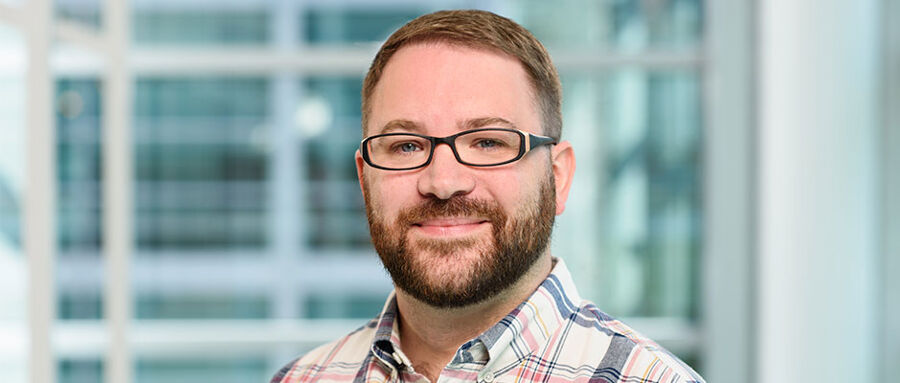
Cal Henderson
Software Engineering BSc
Cal was already working in his chosen industry alongside his studies at BCU, but knew a degree would open even more doors for him. After graduating, he joined a start-up that went on to create Flickr. After Flickr was acquired by Yahoo, Cal and his team went on to set-up Slack, the leading instant messaging and collaboration platform. As a Co-Founder and CTO, his career has evolved in ways he couldn’t have ever imagined.
“I chose BCU because I liked the campus, the lecturers, and I liked the look of the course too. I chose to study Software Engineering as it wasn’t purely computer science. It was more practical than theoretical, which is what I wanted.
I actually started working in the industry before I even joined BCU, so when I was a student, I was working in London part-time, and travelling up to Birmingham for lectures.
It was really important to me that I got a degree, because that would mean I would be able to get visas to work in other countries. It’s a necessary bar for a lot of jobs, so it was important to have that on my CV. I also learned useful skills from my degree that were immediately applicable to the job that I was doing.
I started a consultancy business with a friend of mine whilst we were still at University, where we would build websites for people. It didn’t really feel like starting a company though, as we were just doing work for clients that we found.
But around a year after graduating, I moved to Canada to work on a start-up that I'd been part of for six months. We were a team of just four at the time, and the company ended up becoming Flickr, the image and video hosting service. The company originally made video games, but that didn’t work, so we built Flickr, which then got acquired by Yahoo.
After that, we started on another start-up, again to try and make video games. But after four years, it wasn’t working, which is when we turned the company into Slack, where I still work now as the Co-Founder and Chief Technology Officer (CTO). We became a public company after about six years, and after eight years, it was acquired.
Today, we employ thousands of people across the world. When we started, we never thought the business would be as big as it is now. We thought, maybe, if everything went amazingly well, it could be worth around $100 million one day, but we never imagined it would be acquired by Salesforce for over $27 billion. It succeeded beyond our wildest dreams.
Back when I first joined my Co-Founders, we focused more on the thinking rather than being entrepreneurial, but then we unexpectedly found success. We definitely never thought it would be as successful as it is, the scale of it is nothing that we could have ever imagined.
When we first got started with Slack, we only had eight people working on it who knew each other really well. But nowadays, there’s over 4,000 employees and it’s this huge global operation. It now has over 200,000 paid customers and daily active users in over 150 countries.
It's such a different experience, working in the company now compared to the old days. It’s funny because I don’t think I would go out and apply for a job like mine now, as it morphed into this role over time, but it has been enjoyable.
I’ve found that if you’re successful, you’ll find your role and your job will change significantly with it. I do such a different role to what I did 10 or 20 years ago. But change is growth, and if you want to succeed, you’ll need to adapt to those changes.
The important thing to remember though, is that the level of success that we have had, is hugely based on luck, the timing being right and things coming together. In the case of both Flickr and Slack, if we’d had been six months or even a year earlier, it probably wouldn’t have been successful. It does, of course, also involve hard work and talent, but it takes a lot of luck, too.
I think it’s also important to remember that most successful tech companies tend to become successful after a setback of some kind. Both Flickr and Slack came off the back of a failed attempt to make video games, so failures are important too. It’s one of the things that makes tech quite unique, this Silicon Valley mentality about encouraging taking risks, celebrating and learning from failure, and then dusting yourself off and trying again.
As much as success has defined my career, it wasn’t all smooth sailing; there was bad stuff along the way, but we kept reinvesting and trying again to get to where we are today. As long as you learn from your mistakes and use that failure as a lesson, then it’s not giving up, it’s just reinvesting what you’ve learnt into the next idea.
Something else that’s really important in this business, is the group of people that you work with. Once you find people that you want to work with even when things are going badly, I think that’s a great sign. I’ve been with this company for almost fifteen years, working with the same set of co-founders. Some are beginning to retire now, but I’m only in my 40s, so I could still do something else. I might even do another start-up one day. I don’t know what the next thing will be, but the bar for whatever I do next is high, so there’s a lot of pressure.
Thankfully, I don’t get as stressed as I used to. There are phases to any company; the first phase, when it’s a new venture or a start-up, you’re fighting for the life of a company that you don’t know if it has a future or not. That is a very stressful period, where you don’t know if the company will even exist in six months' time.
Then, there’s the middle phase, where you know it’s going to exist for a while at least, but you don’t know how successful it’s going to be, or even what kind of company it’s going to be either.
Then, you go into the phase that my company is in now, where we’ve gone public, and we’ve been acquired. We've hit all the major milestones and on a massive scale, so now it’s about how much further we can stretch this, which is probably the lowest stress level of those phases. We've already proven that we can be successful, so it just helps to be less serious about it, and recognise how lucky that I’ve been to be in this situation, and to really make the most of it too.
My biggest advice to current BCU students and fellow graduates is to learn from the things that don’t work out. There’s a resiliency to this industry and it’s important to remember that every time you see somebody who’s had a successful career, you’re only seeing their high points and the things that have worked out for them.
Remember that almost anybody who’s had any level of success, has had some failures, too. So don’t let yourself become discouraged if your career path isn’t a smooth upward trajectory, because most people’s aren’t.”

Join our community
Stay connected as a BCU graduate and join our Alumni community. From news and events to career advice, our community is with you through graduation and into your future.